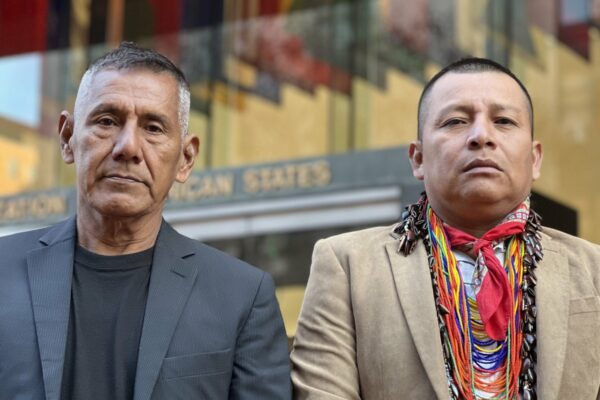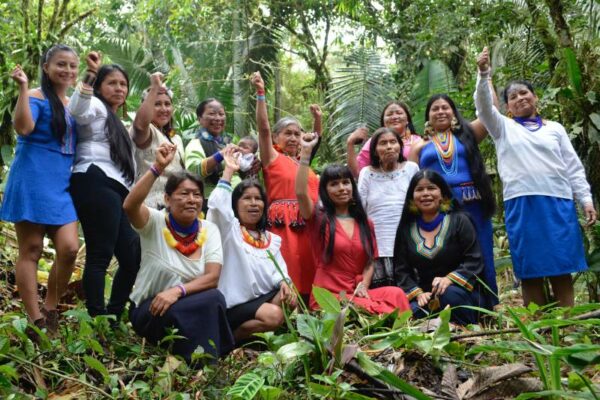Cubara, Colombia – Roberto Perez feels defeated.
And it’s not just because he is winded and sweating after climbing a steep mountain slope near this ranching and farming town. Behind him, on a wide, rugged pasture, orange plastic flags mark ground zero in a nine-year battle between the U’wa Indians and Occidental Petroleum.
“This can’t be permitted, this attack against the life of an ancient community that has existed in peace and tranquillity,” says Perez, president of the U’wa governing council. “What we’re saying is: Respect our territory.”
The dispute is the most dramatic of several indigenous conflicts in Latin America pitting radical Indian communities against governments or private energy companies.
But the project Perez wants to block has already begun. The flags indicate the perimeter of the site in northeast Colombia where Occidental plans to sink a test drill in its search for crude oil. Seismic surveys indicate as much as 1.3-billion barrels may be beneath the spot where Perez is sitting on a rough bench fashioned from a tree trunk. A big oil find could give a jolt to Colombia’s flagging oil sector and shaky economy.
To Perez and 5,000 fellow U’was, the flags are on ancestral territory and the project spells environmental disaster, social degradation and the beginning of the end of an indigenous culture.
The U’was have all but exhausted their legal challenges and political capital. U.S. activists have provided most of the steam and financing for the anti-Occidental campaign, protesting at the company’s headquarters in Los Angeles and at the offices of Boston-based Fidelity Investments, a major Occidental shareholder. In March, three American activists working on behalf of the U’was were killed by leftist guerrillas.
The controversy dates to 1991, when Occidental acquired rights from the Colombian government to explore a vast swath of land that overlapped the U’wa reservation. The U’was resisted Occidental’s initiatives and declared in 1995 that if the project moved forward, they would commit mass suicide by throwing themselves off a cliff.
Last August, in a gesture that officials hoped would placate the U’was, the government expanded the tribe’s reservation fourfold to roughly two-thirds the size of Rhode Island. A month later, Colombia’s environment minister signed a long-awaited permit that allowed the multinational corporation to move ahead with the test drill outside the rejiggered borders.
Contrary to government hopes, the U’wa community vowed to continue its fight, saying the drill site fell within the tribe’s “traditional territory,” a vast area that extends far beyond the boundaries of the legally recognized reservation and even into Venezuela.
In an 11th-hour effort to stall the project, the U’wa community in November bought two farms that cover the drill site and began a sit-in. But citing Colombian laws that give ownership of the subsoil to the government and that allow the government unfettered access to recover petroleum, a judge authorized the eviction of the U’wa from the land. On Jan. 25, two police helicopters carted between 16 and 26 protesters off the land.
About 300 soldiers now guard the site and the surrounding hills to protect it against the project’s opponents.
Occidental officials have refused to comment publicly except to say the company hopes to sink the well by midsummer.
The U’wa haven’t given up. “The more they push us back, the more we’ll come,” says Roberto Cobaria, a former president of the U’was’ ruling council.
Early this month the U’was staged a human blockade of the region’s main road, paralyzing traffic and commerce for several days until anti-riot police used tear gas to clear the road. The tribe claims that three children drowned in the confrontation when they fled into a nearby river. Last week, a local news channel displayed the first evidence of the U’was’ allegations – the corpse of a 4-month-old boy – and said the case had been referred to the attorney general.
More blood may color the conflict in coming months.
In January members of the National Liberation Army, a leftist rebel group, pushed several Occidental-contracted earthmoving machines into a ravine. Days later, the group broadcast a statement over local radio promising to stiffen military action against multinational oil companies, which the insurgency regards as thieves of Colombia’s national resources.
The U’was have developed something of a peaceful coexistence with the National Liberation Army but have lashed out at the country’s other guerrilla group, the Revolutionary Armed Forces of Colombia, or FARC, which was responsible for the deaths of the three U.S. activists.
In a communique, the U’wa accused the group of colluding with Occidental and the government. The message will undoubtedly breed further confrontations between the two guerrilla groups, who are battling for territory in the largely unpoliced region.
The indigenous community is appealing for the formation of a government commission to investigate its case, but the law and public sentiment are now on Occidental’s side.
Both of Bogota’s principal daily newspapers recently expressed frustration with the continuing U’wa campaign, noting the generous allocation of land and that drilling will happen outside the tribe’s official boundaries.
“It’s no surprise that a case like this has drawn so much international attention,” El Tiempo said in a Jan. 30 editorial. “The stereotype is perfect: a small indigenous community confronting a depraved multinational petroleum company, in a country where human rights are violated all over the place. But the reality of what is going on … is something else altogether.”













